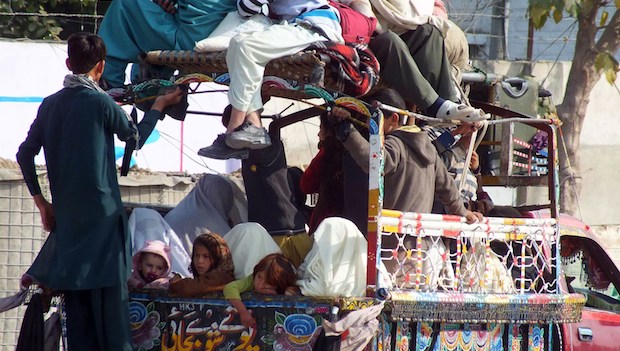
Internally displaced Pakistani tribal civilians fleeing from military operations against Taliban militants in North Waziristan arrive in Bannu, a town on the edge of Pakistan’s lawless tribal belt of Waziristan, on January 22, 2014. T(AFP PHOTO/KARIM ULLAH)
Peshawar, AP—Thousands have fled Pakistan’s troubled northwest region bordering Afghanistan after airstrikes this week targeting suspected Taliban militant hideouts killed dozens of people, elders and officials said Saturday.
Pakistan’s air force launched the airstrikes in North Waziristan after the Taliban claimed responsibility for deadly attacks against security forces there and elsewhere.
There were conflicting claims about who was killed in the airstrikes, which began late Monday and continued into early Tuesday. A military official said the strikes killed 40 insurgents, while residents said civilians were among the dead.
Latifur Rehman, a provincial disaster management spokesman, said Saturday the strikes displaced 6,000 families, but half of them had gone back to their homes. Rehman said authorities were making arrangements to provide shelter and food to those affected.
A tribal prominent elder, Gul Saleh Khan, said more than 70,000 people had left their homes. He said people were still fleeing to nearby towns, villages and cities.
“We were sleeping at our home when the army suddenly started the airstrikes just before midnight on Monday,” Khan said. “We quickly moved to a farm field with women and children, and other people also spent that night under the sky.”
Khan said he arrived in the northwestern city of Peshawar with his family on Tuesday.
Local resident Raham Nawaz said many had to leave their homes due to fears of a full-fledged military operation.
“The government should have issued a warning before dropping bombs in our villages,” Nawaz said. He said his family and other relatives were living at a school, miles away from their town of Mir Ali.
Resident Salim Khan said people continued to flee Saturday. He urged the government to making public warnings ahead of such airstrikes.
“How we can go back to our homes when we don’t know what will happen tomorrow?” Khan asked.
Angered over the increasing violence, people are pressuring the civilian government of Prime Minister Nawaz Sharif to tackle the issue of militancy aggressively. Sharif long has supported a policy of negotiating with militants.
The Pakistani Taliban said earlier this week that they would be interested in peace talks but only if the government proved it was sincere and had enough “power,” a reference to the perception that the army wields the real power in Pakistan.
Pakistan has carried out several offensives against the Taliban in other tribal regions, but North Waziristan has largely been spared.
